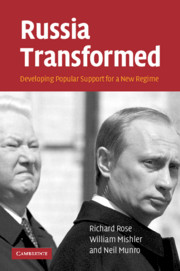Book contents
- Frontmatter
- Contents
- List of figures
- List of tables
- Acknowledgments
- Introduction Transformation and its aftermath
- 1 Time matters: the dynamics of regime support
- 2 The supply of regimes: democratic and autocratic
- 3 A changing supply of Russian regimes
- 4 Uncertainties of transformation: a view from the bottom
- 5 Changing levels of regime support
- 6 Social structure and the evaluation of regimes
- 7 The influence of political values and performance
- 8 Finding the economic influences that matter
- 9 The impact of the passage of time
- 10 What could challenge the new equilibrium?
- Appendix A New Russia Barometer samples
- Appendix B Coding of variables
- References
- Index
2 - The supply of regimes: democratic and autocratic
Published online by Cambridge University Press: 22 September 2009
- Frontmatter
- Contents
- List of figures
- List of tables
- Acknowledgments
- Introduction Transformation and its aftermath
- 1 Time matters: the dynamics of regime support
- 2 The supply of regimes: democratic and autocratic
- 3 A changing supply of Russian regimes
- 4 Uncertainties of transformation: a view from the bottom
- 5 Changing levels of regime support
- 6 Social structure and the evaluation of regimes
- 7 The influence of political values and performance
- 8 Finding the economic influences that matter
- 9 The impact of the passage of time
- 10 What could challenge the new equilibrium?
- Appendix A New Russia Barometer samples
- Appendix B Coding of variables
- References
- Index
Summary
Political systems pose a problem of choice: that choice presupposes a choice between better and worse, not between good and true or bad and false in the absolute sense.
Giovanni SartoriIn hindsight, the choice of institutions for an established regime may appear inevitable, but when a new regime is being created it is anything but. The institutions of democracies take many different forms, and member-states of the United Nations demonstrate that there are many forms of undemocratic rule too. Moreover, political elites who bargain about what the new regime ought to be can disagree about what makes a political system better or worse. A despotic or plebiscitarian regime is no more a failed democracy than a democracy is a failed despotism. Each is a distinctive type.
The mass of citizens do not choose the regime that elites supply. Subjects are asked to accept or reject a bundle of institutions as a whole. If a referendum is held, there is no opportunity to pick and choose between the parts that constitute the new regime. The only choice is between voting for it or against it. Even if the ballot is held under conditions that are free and fair, the choice is hardly balanced if it is between endorsing institutions that have filled the void created by transformation or maintaining an uncertain and provisional authority.
To describe a new regime as in transition does not tell us where it is coming from or where it is heading.
- Type
- Chapter
- Information
- Russia TransformedDeveloping Popular Support for a New Regime, pp. 29 - 48Publisher: Cambridge University PressPrint publication year: 2006



